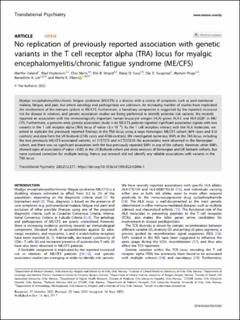| dc.contributor.author | Ueland, Marthe | |
| dc.contributor.author | Hajdarevic, Riad | |
| dc.contributor.author | Mella, Olav | |
| dc.contributor.author | Strand, Elin Bolle | |
| dc.contributor.author | Daysi Duarte, Sosa | |
| dc.contributor.author | Saugstad, Ola Didrik | |
| dc.contributor.author | Fluge, Øystein | |
| dc.contributor.author | Lie, Benedicte Alexandra | |
| dc.contributor.author | Viken, Marte Kathrine | |
| dc.date.accessioned | 2023-01-04T13:39:12Z | |
| dc.date.available | 2023-01-04T13:39:12Z | |
| dc.date.created | 2022-10-04T13:01:53Z | |
| dc.date.issued | 2022 | |
| dc.identifier.citation | Translational Psychiatry. 2022, 12 . | en_US |
| dc.identifier.issn | 2158-3188 | |
| dc.identifier.uri | https://hdl.handle.net/11250/3040987 | |
| dc.description | This article is licensed under a Creative Commons Attribution 4.0 International License, which permits use, sharing, adaptation, distribution and reproduction in any medium or format, as long as you give appropriate credit to the original author(s) and the source, provide a link to the Creative Commons license, and indicate if changes were made. The images or other third party material in this article are included in the article’s Creative Commons license, unless indicated otherwise in a credit line to the material. If material is not included in the article’s Creative Commons license and your intended use is not permitted by statutory regulation or exceeds the permitted use, you will need to obtain permission directly from the copyright holder. To view a copy of this license, visit http:// creativecommons.org/licenses/by/4.0/. | en_US |
| dc.description.abstract | Myalgic encephalomyelitis/chronic fatigue syndrome (ME/CFS) is a disease with a variety of symptoms such as post-exertional malaise, fatigue, and pain, but where aetiology and pathogenesis are unknown. An increasing number of studies have implicated the involvement of the immune system in ME/CFS. Furthermore, a hereditary component is suggested by the reported increased risk for disease in relatives, and genetic association studies are being performed to identify potential risk variants. We recently reported an association with the immunologically important human leucocyte antigen (HLA) genes HLA-C and HLA-DQB1 in ME/ CFS. Furthermore, a genome-wide genetic association study in 42 ME/CFS patients reported significant association signals with two variants in the T cell receptor alpha (TRA) locus (P value. | en_US |
| dc.language.iso | eng | en_US |
| dc.publisher | Springer Nature | en_US |
| dc.rights | Navngivelse 4.0 Internasjonal | * |
| dc.rights.uri | http://creativecommons.org/licenses/by/4.0/deed.no | * |
| dc.subject | Myalgic encephalomyelitis/chronic fatigue syndrome (ME/CFS) | en_US |
| dc.subject | Fatigue Syndrome | en_US |
| dc.subject | genetics | en_US |
| dc.title | No replication of previously reported association with genetic variants in the T cell receptor alpha (TRA) locus for myalgic encephalomyelitis/chronic fatigue syndrome (ME/CFS) | en_US |
| dc.type | Peer reviewed | en_US |
| dc.type | Journal article | en_US |
| dc.description.version | publishedVersion | en_US |
| dc.rights.holder | © The Author(s) 2022 | en_US |
| dc.source.pagenumber | 1-5 | en_US |
| dc.source.volume | 12 | en_US |
| dc.source.journal | Translational Psychiatry | en_US |
| dc.identifier.doi | 10.1038/s41398-022-02046-1 | |
| dc.identifier.cristin | 2058376 | |
| dc.source.articlenumber | 277 | en_US |
| cristin.ispublished | true | |
| cristin.fulltext | original | |
| cristin.qualitycode | 1 | |

